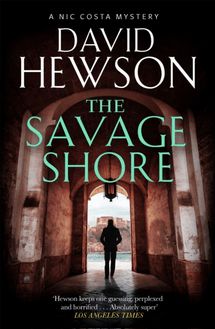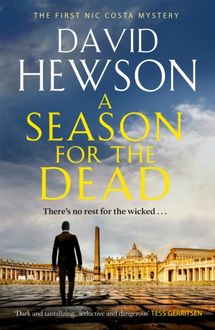Savage Shore , livre ebook
151
pages
English
Ebooks
2019
Vous pourrez modifier la taille du texte de cet ouvrage
Obtenez un accès à la bibliothèque pour le consulter en ligne En savoir plus
Découvre YouScribe et accède à tout notre catalogue !
Découvre YouScribe et accède à tout notre catalogue !
151
pages
English
Ebooks
2019
Vous pourrez modifier la taille du texte de cet ouvrage
Obtenez un accès à la bibliothèque pour le consulter en ligne En savoir plus
Publié par
Date de parution
02 mai 2019
Nombre de lectures
1
EAN13
9781786895028
Langue
English
David Hewson is a former journalist with The Times, The Sunday Times and the Independent . He is the author of more than twenty-five novels including his Rome-based Nic Costa series which has been published in fifteen languages. He has also written thre acclaimed adaptations of the Danish TV series, The Killing . @david_hewson davidhewson.com/blog/
Also by David Hewson
The Nic Costa Series
A Season for the Dead
The Villa of Mysteries
The Sacred Cut
The Lizard's Bite
The Seventh Sacrament
The Garden of Evil
Dante's Numbers
The Blue Demon
The Fallen Angel
The Savage Shore
The Killing
Part I
Parts II
Part III
First published in Great Britain, the USA and Canada in 2019 by Black Thorn, an imprint of Canongate Books Ltd, 14 High Street, Edinburgh EH1 1TE
This digital edition first published in 2019 by Black Thorn
First published in 2018 by Severn House Publishers Ltd, Eardley House, 4 Uxbridge Street, London W8 7SY
blackthornbooks.com
Copyright © David Hewson, 2018
This is a work of fiction. Names, characters, places and incidents are either the product of the author's imagination or are used fictitiously. Except where actual historical events and characters are being described for the storyline of this novel, all situations in this publication are fictitious and any resemblance to actual persons, living or dead, business establishments, events or locales is purely coincidental.
British Library Cataloguing-in-Publication Data A catalogue record for this book is available on request from the British Library
ISBN 978 1 78689 485 4 eISBN 978 1 78689 502 8
If justice is taken away then what are states but gangs of robbers? And what are gangs of robbers themselves but little states?
St Augustine, The City of God
CONTENTS
Epigraph
Part One: Martinis for a Marmoset
Part Two: The Wine-Dark Sea
Part Three: The Fist of Rock
Part Four: A Time to Kill
Part Five: The Sicilians
Part Six: The Grave of Carcagnosso
Part Seven: A Momentary Music
Author s Note
PART ONE
Martinis for a Marmoset
Extract from Calabrian Tales , by Constantino Bergamotti
(1898-1955)
first published 1949
Chapter IV: The Gardu a
I n the eighth century, when the Moors ruled much of the Iberian peninsula, there was a priest named Apollinario, a hermit who lived in a cave in the hills above C rdoba. One day the Virgin Mary came to him in a dream and declared that he was destined to be the saviour of his native Spain, forming an army to drive the Muslims from God s beloved Catholic nation.
Flattered as he felt by this divine revelation, Apollinario was reluctant to take on such a task. He was a priest not a soldier, let alone a general. The Moors were everywhere. They were for the most part benign rulers, willing to tolerate those of other faiths, builders of great mosques and libraries, creators of a rich and philanthropic civilisation. How could one unworldly priest fight such a power? And with what?
Seeing his doubts the Virgin reached out and gave him a silver bracelet from her wrist. When Apollinario touched this precious item he knew that her strength, which came directly from God, now lay within him. In this way began the Gardu a, Apollinario s sacred army, warriors of the night, fighters determined to rid Europe of Muslim domination.
With the private blessing of the Church, this band of holy villains grew to thousands, all of them sworn to destroy the followers of Allah, not through bloody confrontation on the battlefield, but by stealth and treachery and theft, the stiletto in the dark, the artistry of tricksters, every criminal device available, since the Arabs, being heathen, merited neither mercy nor forgiveness. Over the centuries the Gardu a quietly gathered like-minded men to their cause, honing their skills as assassins and vagabonds, murdering, raping, robbing, and pillaging, slaying Muslims, Jews, and any Christians who opposed them, before seeking, and gaining, forgiveness for their sins.
Around 1670 the Inquisition, which had used their talents to such effect, began to turn on its loyal servants, seeing them as a pernicious criminal element that threatened the Vatican s own temporal power. Throughout Spain thousands of loyal members were arrested, many executed, the rest stripped of homes and possessions, thrown into dank prisons, their families left to starve in destitution. Those of Apollinario s children who remained fled into the hills whence they came, hiding their identities, surviving as best they could by virtue of the only talents they knew.
Three of the boldest, Catalan brothers Osso, Mastrosso and Carcagnosso, found themselves trapped in the city of Barcelona, with the king s men standing between them and their mountain home, knowing they were the greatest prize of all since they had in their possession Apollinario s precious silver bracelet given to him by the Virgin. Outflanking the soldiers of the Inquisition in the dead of night, they stole a flimsy fisherman s dory from the harbour and cast themselves upon the mercy of the waves. This was in November of 1673, at the beginning of a vicious winter that straddled the length of the Mediterranean, one which would witness the sea freeze in Siracusa, beggars die of bitter cold in the grand avenues of Alexandria, and snow cover the Temple Mount in Jerusalem for weeks on end.
The brothers fought to control their little boat on the wild waters of the Balearic, hoping to reach Mallorca and safety in Palma, where some of their Gardu a brothers had found sanctuary. They were God s thieves, not sailors, and knew nothing of navigation or seafaring. So fierce was the storm that their flimsy boat was tossed about like flotsam for eight long days and nights. These young men grew weak and confused, fearing their lives would be lost on the cold grey ocean, each in turn clutching Mary s holy bracelet to his chest, praying for deliverance.
Perhaps the Virgin was listening, even through the tempest. Starving and close to madness, finally they found themselves beached in Sardinia, near to the city of Cagliari, stranded in a nation which spoke their native Catalan and was, in law at least, still beholden to the kingdom of Castile.
Yet this was not true Spain. They were on the borders of the east, close to a mythical world of pirates and bandits, thieves and ruffians, the Hinder Sea of the Jews, the Mesogeios of Homer, the Mare Nostrum, following in the footsteps of so many others like them, the Vikings and the Normans, the Turks and the Saracens. And the greatest brigands of all, the Romans.
On this foreign soil these three brothers rediscovered themselves as a new Gardu a, lying, cheating and stealing now from the wealthy and barbaric Sardinian lords. Their fortunes rose. Their stock improved. Soon they came to see that one island was too small to encompass three such ambitious and talented men. With many tears and embraces, each knowing that separation was the only alternative to division and death, they bade each other farewell and set off to establish their individual fortunes, Mastrosso to Naples, Osso to Sicily, and Carcagnosso to Reggio at the tip of Italy s toe in Calabria.
Here is the history of the south, Garibaldi s Mezzogiorno, written with the blood spilled by these three brothers from Spain and those who came after. In Naples, Mastrosso began the brotherhood that came to be known as the Camorra, the name coming from capo morra , meaning boss of the crooked street game by which the innocent are fleeced of their wages. Not that alley tricks for a pittance were the Camorra s principal interests for long.
In Palermo, Osso took a similar path, his creation coming to bear the name Cosa Nostra or Mafia, the origins of which are challenged by many, and perhaps impossible to pin down. The third brother, Carcagnosso, made the longest, hardest journey of all, to the bare, bleak land at the foot of Aspromonte, the last remaining fragment of ancient Greece in Italy. With his sons he came to form the Ndrangheta and here the etymology is clear: the Greek andragathia , meaning those who are full of a strong goodness .
It is natural that they should choose the ancient tongue of the eastern Mediterranean to describe themselves. Calabria is but the modern face of Magna Graecia, Greater Greece . The language of Aristotle and Demosthenes remains more audible in our local dialects than in the demotic Greek heard today on the other side of the Ionian.
Ndrangheta.
Strange, impenetrable, unpronounceable, fearsome. The name of the honourable men seemed made for the sons of Carcagnosso as they seized Calabria, populating its inhospitable mountain ranges, its primitive ports and fishing harbours, bringing a kind of society, of civilisation, to an impoverished and neglected hinterland about which Rome and Florence and Milan cared nothing.
While the Mafia grew greedy and sought fame and riches in America, while the Camorra quarrelled, turned corrupt and untrustworthy, the Ndrangheta alone remained true to the Gardu a, the sum of their fathers, nothing more, nothing less, their blood running pure from generation to generation.
The crones in the mountains say that somewhere in the bare, cold hills of Aspromonte may be found a grotto containing the silver bracelet of the Virgin Mary, given to the timid monk Apollinario somewhere outside C rdoba in a distant era when Andalusia rang to the cry of the muezzin, not the plainchant of the Holy Church. And by the altar in this hidden lair lies the tomb of his loyal follower, Carcagnosso.
A fairy tale for children? This is possible, so perhaps it has no part in history. What remains undeniable is this: only in Calabria does the spirit of the Gardu a live on among the honourable men . They serve still, strong in their silence, asking nothing more than loyalty, obedience and their due, infected, like the Greeks before them, by the spirit of the land, which is wild and free, invincible even to time itself.


